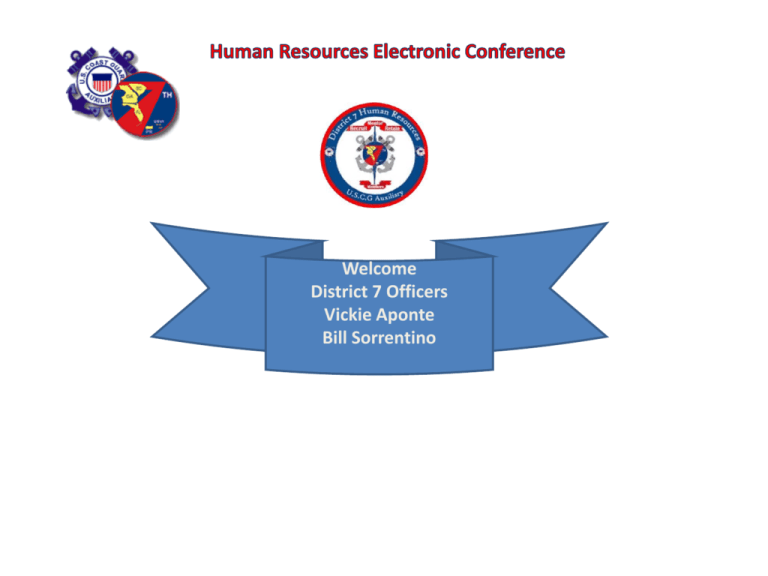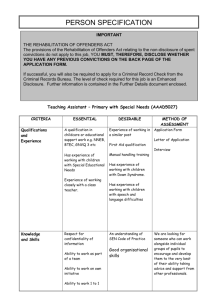HR Electronic Presentation Slides
advertisement

Welcome District 7 Officers Vickie Aponte Bill Sorrentino With respect to criminal history, Page 2 of the enrollment application states what criminal history documents are required to be submitted with the application. Under no circumstances will an enrollment application be denied based on criminal history. A criminal conviction does not automatically disqualify one from enrollment. That decision rests with the U.S. Coast Guard’s Director of Auxiliary. CAN HR/FC OFFICERS REFUSE TO PROCESS AN APPLICATION FROM AN APPLICANT THAT HAS COMMITTED A FELONY?????? This is the procedure to follow if an applicant has a criminal past: Past criminal history o All felony convictions and all major misdemeanor convictions must be disclosed at the time of enrollment. This includes military courts-martial. o Submit official court documents detailing Initial charges and final disposition for each arrest, charges and/or indictments. o Submit a letter or memo addressed to the Commander, 7th Coast Guard District (dpa), for each arrest case with the following information: Per DIRAUX 7 Office, if someone sends in an application with criminal history information in a sealed envelope, it is to remain sealed with the application. We are no longer authorized to review the information if it is sealed. If it is not sealed, then review it. However, they must be told it can be sealed. Date and time of arrest City and state of arrest Arresting agency Initial charges and degree (Indicate whether or not the initial charge was a felony or misdemeanor) Details of each incident leading up the arrest, including mitigating circumstances or supporting details post arrest, including final charges and disposition. Pending criminal court action or judicial procedure o Follow the procedure listed on page 2 of the enrollment application. Non-criminal traffic infractions are not included in criminal history. Although the enrollment application instructions state that this information is mandatory for “convictions,” if an applicant has issues in their past, such as arrests with no convictions, it may be wise to disclose them with a letter of explanation attached to the application. The Security Center (SECCEN) and/or the Director will ultimately require an explanation. Failure to disclose this information at the time of enrollment will only delay the processing. Intentionally failing to disclose required criminal history information will be grounds for disenrollment. Applicants, other than putting a check mark on "convictions” on Page 2, Section VII of the enrollment application, are not required to disclose criminal history specifics to flotilla personnel if they choose not to. This information can be placed in a sealed envelope attached to the enrollment application for submission to the division security officer (DDSL). The DDSL’s (Director’s Division Security Liaison) are the only Auxiliary personnel in District 7 authorized to review this information. Each DDSL has on file a Non-Disclosure Agreement with the director's office. The DDSL is required to review this information to ascertain if all the required criminal court documents are attached to the enrollment application. Indicates no middle name Indicates no other names used Fingerprint Card FD-258 Rev 3-1-10 ALL FD-258 REVISIONS ACCEPTABLE Leave Blank Fingerprint Card FD-258 Rev 3-1-10 – DIRAUX Copy Leave Blank LEAVE BLANK Fingerprint Card SF-87 Rev March 2013 ONLY ACCEPTABLE SF-87 FINGERPRINT CARD Leave Blank No Initials - Name See Back Multiple names should be listed on the back of the fingerprint card – no nicknames No names – indicate N/A If you are a Qualified Fingerprint Tech you can sign off on fingerprints and citizenship. If you are not a Qualified Fingerprint Tech you cannot sign off on fingerprints and citizenship and the application will be returned. If you have the fingerprints done by Law Enforcement, they can sign off on the fingerprints and citizenship. Mandated training. What comes to mind when you hear those words? Probably a large variety of responses. Now pair "mandated training" with "volunteer organization" and imagine the responses! Yes, the Coast Guard Auxiliary is a volunteer organization, and yes, we do have some mandated training. As a uniformed volunteer group we represent the Coast Guard, and in the public eye are often thought of as one and the same. Therefore the Coast Guard wants us to have the same type of training and instruction as their active military members. Thus: mandated training! The courses cover topics such as ethics, civil rights, and privacy, among others. These courses can be taken on line at your convenience, usually in an hour or less per course. To get started follow these procedures: 1. Log on to https://auxlearning.uscg.mil which brings up a page entitled AUX LMS (auxiliary learning management system) 2. Your login is your email address associated with your auxiliary data. 3. Click on "forgot password". 4. A password will be emailed to you. 5. Use the password to complete the login process. A screen will then prompt you to change your password. 6. After completing the login you will see a screen with the Course Catalog. Click on Auxiliary Courses, 7. Next click on Mandated Training. You should now see a screen listing 8 courses by number and title, as follows: 502290 Influenza Training 502306 Ethics 1 Personal Gifts 502319 Civil Rights Awareness 502379 Building Resilience and Preventing Suicide in the Coast Guard 810000 Sexual Harassment Prevention 810015 Privacy at DHS: Protecting Personal Information 810030 Security Fundamentals 810045 Sexual Assault Prevention/Response These courses can be taken in any order, and as mentioned above, can typically be completed in an hour or less, New members are asked to complete all the courses in the first year of membership, and anyone else who has not yet completed these, there's no time like now! Happy computing!





